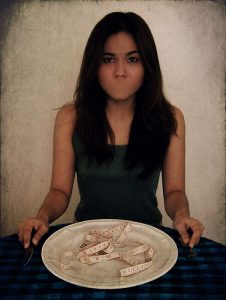Dieting And Eating Disorders: Three Distinctions
 Although they share several behaviors, there are definite differences between dieting and having an eating disorder.
Although they share several behaviors, there are definite differences between dieting and having an eating disorder.
Looking at those differences may clear up any confusion you have about whether you or someone you know is dieting or has a diagnosis.
The best thing to do, if you are worried about yourself, is to talk to your doctor. If sharing this concern with your doctor (or anyone else) is unacceptable to you, it is possible that you have an eating disorder. The sooner you talk to someone and get help, the better. Listen to the voice within that knows what is best for your long-term health.
Difference in Weight Loss Goals or Purpose
Dieters are obviously trying to lose weight and may look forward to dropping a few clothing sizes, but their main goal is most often to be healthier. They may want to feel better, avoid future health problems, be able to enjoy activities with children and grandchildren, and live as long as possible.
An individual with an eating disorder is very focused or fixated on food, body fat, weight loss, and their appearance – but not for health reasons. What the scale reveals is of vital importance and so is the image in the mirror, but better health and longevity are not the concerns.
Difference in Disclosure
Many dieters are not secretive about being on a diet. It may even be a frequent topic of their conversations. They might eat “forbidden” snacks when no one is looking and later confess it to someone or openly cheat on their diet for one reason or another. Dieters who are more private by nature may not broadcast being on one, but people close to them usually know about it.
With eating disorders, there is typically an element of secrecy. People hide the fact that they are not eating, hide their bodies under baggy clothes, or hide their purging behavior. They do not reveal their obsessive thoughts about food and fat, especially with those who are close to them.
Difference in Choices or Restrictions
Those who are dieting naturally make changes in what they eat and how much. Except for a few wacky diets that people try, dieters mostly make common-sense, rational decisions about what they can and cannot consume to lose weight or cholesterol points. Their dietary changes make sense to themselves and will seem reasonable to others as well. Plus, if they choose to, they can change or stop the dietary restrictions.
People struggling with an eating disorder may adopt severe restrictions concerning how much and what they can eat. If they were to reveal the restrictions, others might consider them over-the-top or irrational, possibly even dangerous. For instance, they might eliminate healthy foods that contain sugar such as apples or grapes. Although they originally choose the restrictions, they cannot stop keeping them.
 Eating Disorder Self Test. Take the EAT-26 self test to see if you might have eating disorder symptoms that might require professional evaluation. All answers are confidential.
Eating Disorder Self Test. Take the EAT-26 self test to see if you might have eating disorder symptoms that might require professional evaluation. All answers are confidential.